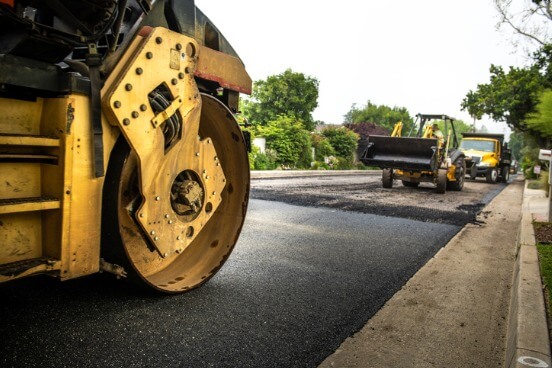Affordable Paving Solutions for Your Driveway
Affordable Paving Solutions for Your Driveway
Blog Article
Discovering the Numerous Sorts Of Asphalt Paving and Their Benefits
The landscape of asphalt paving includes a selection of types, each engineered to attend to particular requirements and environmental considerations. From the durable qualities of Warm Mix Asphalt to the environment-friendly qualities of Recycled Asphalt Sidewalk, understanding these options can dramatically affect project outcomes. Advancements such as Cozy Mix Asphalt and Porous Asphalt present added layers of performance and sustainability. As we discover these different paving services, the nuanced advantages they provide might stun you and possibly change your strategy to future paving projects.
Hot Mix Asphalt
When taking into consideration one of the most effective leading options, hot mix asphalt (HMA) stands out as a leading choice for numerous applications (paving). HMA is a functional paving material known for its longevity, versatility, and general efficiency. It is produced by home heating asphalt binder and integrating it with accumulations at heats, making certain an uniform blend that can stand up to various environmental conditions
One of the main advantages of HMA is its ability to offer a smooth, skid-resistant surface area, boosting security for cars and pedestrians alike. Furthermore, HMA displays superb resistance to deformation, making it optimal for high-traffic areas such as highways and parking area. Its versatility to different climates further adds to its widespread usage.
The setup procedure of HMA is reasonably fast, enabling reliable job completion with minimal disturbance to traffic. Moreover, it can be reused, lowering waste and advertising sustainability within the building sector. On the whole, warm mix asphalt remains a leading option for paving professionals because of its durable efficiency characteristics and long-term cost-effectiveness, making it a trustworthy solution for different infrastructure demands
Warm Mix Asphalt
Cozy mix asphalt (WMA) uses a cutting-edge option to hot mix asphalt, providing similar benefits while calling for lower production temperature levels. Generally generated at temperature levels between 190 ° F and 250 ° F, WMA technology decreases energy usage and greenhouse gas exhausts during production, making it an extra environmentally friendly alternative.
This adaptability can lead to improved compaction and overall resilience of the asphalt surface. Furthermore, WMA can be utilized in different applications, varying from highways to household driveways, without compromising efficiency.

The incorporation of additives or changed binders in WMA contributes to its boosted residential or commercial properties, making sure that it satisfies or exceeds performance standards. Furthermore, WMA's decreased pop over here thermal impact during manufacturing can reduce the chance of damages to the surrounding atmosphere, making it an enticing selection for lasting paving practices.
Cold Mix Asphalt
Cold mix asphalt is a versatile leading solution typically used for momentary repair work and low-traffic areas. This kind of asphalt is produced at ambient temperature levels, making it a practical selection for quick fixes and projects where conventional warm mix asphalt may not be possible. The mix typically includes asphalt binder, accumulation, and ingredients, enabling it to remain workable for an extended duration.
Among the primary advantages of chilly mix asphalt is its simplicity of application. It can be mounted without specific tools, making it obtainable for smaller contractors and DIY enthusiasts. In addition, cool mix can be used in numerous climate conditions, which is especially useful for urgent fixing needs.

It may not supply the exact same long-lasting sturdiness as warm mix asphalt, its fast application and flexibility make it an exceptional option for short-term services and low-traffic applications. In general, cold mix asphalt continues to be a functional alternative in the asphalt paving landscape.
(read full article)
Permeable Asphalt
Permeable asphalt is an ingenious paving service created to improve stormwater monitoring and minimize surface area runoff. This kind of asphalt features a special structure that integrates interconnected voids, permitting water to penetrate through the surface and right into the underlying layers. By facilitating natural drain, porous asphalt helps alleviate the risk of flooding and lessens the burden on municipal stormwater systems.
One of the main benefits of porous asphalt is its ability to improve water quality. As stormwater infiltrate the sidewalk, pollutants and sediments are trapped, reducing the variety of impurities that enter neighborhood rivers. This adds to much healthier ecological communities and supports conformity with ecological policies.
Additionally, porous asphalt can boost the durability of the pavement itself. By minimizing water buildup on the surface area, it minimizes the capacity for freeze-thaw cycles that can cause breaking and wear and tear. In addition, the minimized need for conventional stormwater administration framework can cause cost financial savings for communities and programmers.
Recycled Asphalt Pavement
(read the post)Recycled asphalt pavement (RAP) stands for a lasting method to street construction and upkeep that profits both the environment and the economic climate. By reusing existing asphalt products, RAP minimizes the need for brand-new basic materials, which in turn saves all-natural resources and decreases ecological influence. This technique lowers energy usage and greenhouse gas exhausts related to the manufacturing of new asphalt.
The consolidation of RAP right into brand-new pavement combinations can likewise bring about substantial cost savings. Specialists can leverage recycled products to reduce overall project expenses, making it an economically feasible choice for municipalities and personal designers alike. Furthermore, RAP offers equivalent performance attributes to virgin asphalt, making sure durability and durability in road surfaces.
RAP's versatility permits it to be made use of in various applications, including freeways, car park great deals, and domestic driveways. By enhancing the architectural stability of existing pavements, RAP adds to enhanced safety and security and level of smoothness of roads.
Conclusion
Hot Mix Asphalt succeeds in sturdiness and rapid installation for high-traffic locations, while Warm Mix Asphalt improves sustainability with decreased power usage. Cold Mix Asphalt offers as an affordable choice for urgent repair services, Porous Asphalt effectively manages stormwater, and Recycled Asphalt Sidewalk advertises ecological responsibility.
Report this page